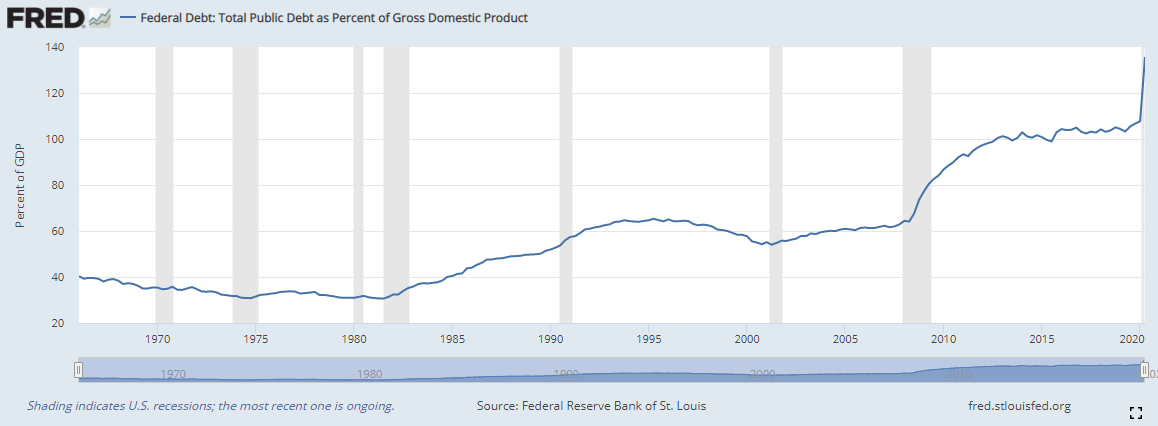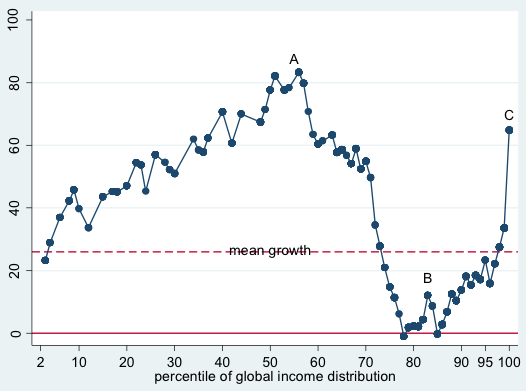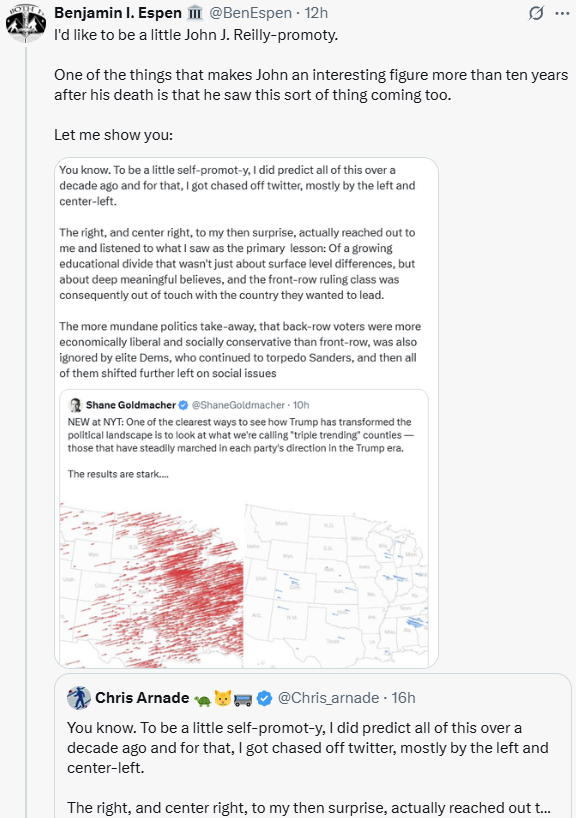The Long View 2008-01-22: Don't Panic; Panic in 2016; Victory with Demobilization; Mahdi Watch
The James Fallows Atlantic piece “Countdown to a Meltdown” from 2005 is an absolutely fascinating bit of political prediction, let’s look at it in more detail, as it combines some of John’s obsessions with some of my own.
Fallows wrote the article as advice to the incoming President in 2017, whom he predicted would be the first President in more than a century who was neither a Democrat nor a Republican. The President who did take office was quite unusual, but not in exactly the ways that Fallows predicted.
The piece is written in the past tense, as if it were 2016, but this is fundamentally an attempt at prediction, and an analysis of what ails the American Republic, from the point of view of an Establishment insider. Let’s identify some key points
- The two dominant parties in American politics have complementary failure modes. This whole essay is an attempt at finding a durable alternative. For 21st century Americans, the most accessible example is the New Deal coalition.
- Fallows guessed correctly that the US would be heavily involved in fighting in the Middle East for the next decade, but missed the essential innovation of the Obama presidency, which would be to make sure that people other than Americans did the dying. And why in the world did he postulate a conflict between Egypt and Pakistan?
- Fallows postulated a tripling of the US Federal Debt by the end of George W. Bush’s second term. As you can see from the St. Louis Federal Reserve, that is a bit of an over-estimate. You can clearly see the inflection point that Fallows identified however.

United States Federal Debt
- Fallows predicted the Dow Jones would top out at 11,000. Hah. I think there is a major piece of business involvement that Fallows was just completely blind to. One of the big drivers of the US debt policy was the willingness of Chinese investors to purchase US treasury bonds. Fallows I think correctly identifies that China did this in line with their mercantilist export policy, keeping the value of their currency low compared to the dollar. Fallows talks about the political rationale for doing this, keeping taxes lower than needed to finance spending, but doesn’t talk about the fact that some people in America got filthy rich by moving the manufacturing base overseas. This was facilitated by the financialization of the economy, and the redefinition of finance as productive in official statistics.

The business reason for increasing federal debt
- Fallows assumed that owning Treasury bonds would give China and other Asian countries leverage over the United States, but seems to have badly misjudged that. Fallows thought that an oil embargo by Venezuela might produce a big enough economic disruption to induce a run on the dollar. This is simply alternative history now, as fracking upending all previous predictions about oil markets.
- One thing Fallows did get right was the impact of a housing asset price decrease on the American economy. His joke about avian-flu quarantines finally came to pass too.
This is a fascinating article, and I recommend reading it in full. It is now comprehensively falsified, but that is not to say the parade of horribles that Fallows conjured up was impossible. However, reflecting on what might have been, and why it did not happen, is usually worth your time.
Shifting gears to another subject, John quotes Mark Steyn who was criticizing a political opponent for imagining that veterans of Iraq and Afghanistan were mentally wounded from killing vast numbers of civilians. Which is a massive exercise in talking past each other, since the conduct of the wars of the last thirty years has been far kinder to non-combatants than previous American wars, but the real scandal of veterans of the War on Terror has been the alarmingly high rates at which they kill themselves.
And finally, Timothy Furnish, a scholar of Islamic millennialism, now blogs at The Occidental Jihadist.
Don't Panic; Panic in 2016; Victory with Demobilization; Mahdi Watch
I have every confidence that the US financial markets will have calmed down by the close of business today. Europe was already taking the large Asian losses in stride earlier today, and the US Federal Reserve is pumping enough happy juice into the financial system to give Dr. Kevorkian pause. (The 0.75% lowering by the Fed of the Federal Funds Rate to 3.5% puts that rate into negative-interest territory only if you consider the Consumer Price index, which rose 4.1% last year; the core rate was 2.4%.) Readers who nonetheless remain distraught may wish to contemplate this image:

Even the return of tranquility after the past few days of unpleasantness will not change the fact that the market for equities is not bright, and there is no reason to see why it should improve for some time to come. Perhaps irrelevantly, I cannot help but reflect how fortunate George Bush is in his legislative defeats. We have already noted in this space how much worse the Administration's condition would be, had its de facto open-borders immigration bill been passed. Now imagine its state if Congress had gone along with the Administration's plan to use Social Security money to create private investment accounts.
* * *
Readers eager for yet greater disasters may wish to compare recent events to a piece by James Fallows in The Atlantic Monthly, a January 20, 2016, Master Strategy Memo for the incoming president of that year, the first president since before the Civil War who is neither a Republican nor a Democrat. That president's chief task is dealing with the effects of a hard-landing dollar collapse that begins in 2008:
Americans had lived through a similar self-intensifying cycle before—but not since the late 1970s, when many of today's adults were not even born. Back in those days the sequence of energy-price spike, dollar crash, interest-rate surge, business slowdown, and stock-market loss had overwhelmed poor Jimmy Carter—he of the promise to give America "a government as good as its people." This time it did the same to the Preacher, for all his talk about "a new Democratic Party rooted in the oldest values of a free and faithful country." When he went down, the future of his party almost certainly went with him....
In this scenario, the Preacher's successor, a popular general, does no better.
* * *
The Kennedy Assassination, it has been widely remarked, was the event that drove the American Left insane. We must consider the possibility that an insufficiently catastrophic outcome in Iraq might have a similar effect today. In this item from Jonathan Rauch, also of The Atlantic Monthly, about how Our inevitable withdrawal from Iraq could poison American politics for a generation, I think we find a fairly mild case of incipient cognitive dissonance:
The audience was a predominantly conservative crowd assembled by the Ethics and Public Policy Center, a right-of- center think tank. The speaker. Bernard Lewis...was asked how things were going in Iraq. He replied that conditions had improved there and would continue to improve. “Unless,” he added, “we are betrayed from within.” ...Unpack that phrase, and then unpack the bland reaction to it, and you have a glimpse of one of the ugliest potential outcomes of an already plenty ugly war: a long-term, low-level, persistent civil conflict—not in Iraq, but in America.
Actually, at this writing, the end of American counterinsurgency combat seems likely, but so does a permanent alliance and base presence. I suspect that people like the author could probably adapt to the reality by embracing some formula about making the best of a bad situation, no matter how advantageous the situation really is. On the other hand, there is a substantial minority of people who cling to the entire Vietnam scenario. The oddest part of that may be the insistence that Iraq and Afghanistan war vets are a psychotic and criminalized class, despite the statistical evidence that those vets are more law-abiding than young men of that age-group as a whole. Mark Steyn has some links and this anecdote:
I picked up a local paper in New Hampshire the other day, and a lady psychotherapist was twittering about our "mentally wounded" troops returning home after killing gazillions and bazillions of Iraqi civilians. In 1933, the debaters at Oxford were horrified by the real cost of war. In 2008, the editors of the Times, our college professors and Hollywood celebrities, are horrified by a fiction. Faced with an historically low cost of war, they retreat into fantasy. Who's really suffering from mental trauma? Who needs the psychotherapy here?
Much of this attitude is just the expression of the ideological inheritance of the Left, but we should note that this inheritance might have lain dormant, like a recessive gene, if the Administration had maintained control of the narrative, which it might have done by shaping its other policies to conform to the needs of the Iraqi enterprise. As it is, the Bush Administration must be credited with the singular achievement of winning a war while demobilizing the country.
* * *
Islamic millenarianism is one of the chief components of Islamism, as we saw in the recent uprising in southern Iraq by the Mahdist group, the Army of Heaven, and as we see in the persistent 12er Shia cast to Iranian policy. This is VERY IMPORTANT STUFF, but I know only two scholars who are following it, and just one of them has a blog. That one is Tim Furnish, and his blog is Mahdi Watch. Do as the blog title says.
Copyright © 2008 by John J. Reilly
Support the Long View re-posting project by downloading Brave browser, and then trying it out. With Both Hands is a verified Brave publisher, you can leave me a tip too!



Comments ()